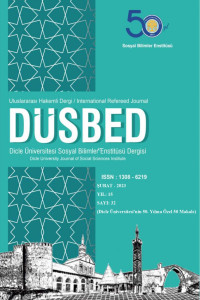İLAHİYAT FAKÜLTELERİNDE EĞİTİM AÇISINDAN KUR’ÂN’I KERÎM DERSİ: DİCLE ÜNİVERSİTESİ İLAHİYAT FAKÜLTESİ ÖRNEĞİ
Abstract
Dinî yükseköğretim veren ilahiyat fakültelerindeki Kur’ân-ı Kerim dersi, teorik ve uygulamalı bir ders olması hasebiyle birçok dersten farklılık göstermektedir. Bu dersin diğer derslerden ayrılan en önemli özelliği, öğrencinin ders sürecindeki gelişiminin sürekli takip edilmesini ve anlık dönütün alınmasını gerekli kılmasıdır. Derste teorik bilgi toplu bir şekilde aktarıldıktan sonra her bir öğrenciye ayrı ayrı zaman ayrılması gerekmektedir. Ancak sınıf mevcutlarının kalabalık olması buna imkân vermemektedir. Bu husus hem öğretici hem de öğrenciler üzerinde olumsuz bir durum oluşturmaktadır. Öğreticilerin iş yükü ders dışına taşmakta, zaman zaman öğrenciler fakülte içindeki veya dışındaki kurslara yönlendirilmektedir. Bu husus öğrencilerde bazı memnuniyetsizliklere yol açmaktadır. Bu çalışmada, Dicle Üniversitesi İlahiyat Fakültesi lisans programı (örgün) bünyesinde eğitim gören ikinci, üçüncü ve dördüncü sınıf öğrencilerinden 251 kişiye anket çalışması yapılmıştır. Ankette, öğrencilerin Kur’ân dersinden beklentileri, derse olan ilgileri ve bu ders hakkındaki memnuniyetleri ölçülmekte olup eğitimlerinin bir kısmı Covid-19 salgınına denk gelen bu öğrencilerin Pandemi sürecinde bu dersten ne gibi kazanımlar edindiği incelenmektedir. Bundan hareketle öğrencilerin Kur’ân dersindeki yeterliliklerinin tespit edilmesinin yanı sıra bu ders özelinde öğrenci, eğitici ve sistemden kaynaklı sorunlar tespit edilmekte ve bu sorunlara birtakım çözüm önerileri sunulmaktadır. Araştırmada nitel ve nicel araştırma yöntemleri birlikte kullanılmıştır.
Keywords
Kur’ân Kırâat İlahiyat Fakültesi Kur’ân Dersi Kur’ân Dersi Eğitimi Dicle Üniversitesi İlahiyat Fakültesi Qiraat Faculty of Theology Qur Qur Dicle University Faculty of Theology
References
- Acar, M. M., & Genç, M. F. (2022). İlahiyat Fakültesi Öğrencilerinin Kur’ân Okuma ve Tecvid Dersine Karşı Tutumları (Kocaeli Üniversitesi İlahiyat Fakültesi Örneği). Kocaeli İlahiyat Dergisi, 6(2), Art. 2. https://doi.org/10.5281/zenodo.7444186
- Alemdar, Y. (2008). İlahiyat Fakültelerinde Kur’ân Dersleri İle İlgili Problemler ve Çözüm Önerileri. Cumhuriyet Üniversitesi İlahiyat Fakültesi Dergisi, 12(1), Art. 1.
- Işıkdoğan, D. (2022). İlahiyat Fakültesi Öğrencilerine Göre Covid-19 Süreci Çevrimiçi Eğitim Etkinlikleri Ve Verimliliği. Dicle İlahiyat Dergisi, 24(2), Art. 2.
- Özdemi̇r, Ö., & Erdoğan, İ. (2021). Covid-19 Pandemisi Sürecinde İlahiyat Fakültesi Öğrencilerinin Uzaktan Eğitim Hakkındaki Görüşleri. Türkiye Din Eğitimi Araştırmaları Dergisi, 12, Art. 12. https://doi.org/10.53112/tudear.999869
- Şenat, F. A. (2016). İlahiyat Fakültesi Öğrencilerinin Kur’ân Okuma ve Tecvid Dersinin İşlenişiyle İlgili Kanaatleri Üzerine Bir Araştırma. Necmettin Erbakan Üniversitesi İlahiyat Fakültesi Dergisi, 42(42), Art. 42.
- Yüksel, Y. (2016). İmam Hatip Liselerinde Kur’ân Eğitimi Üzerine Bir Araştırma (Tekirdağ Örneği). Namık Kemal Üniversitesi İlahiyat Fakültesi Dergisi (NKUIFD), 2(1), Art. 1.
THE TEACHING OF THE QURAN AS A SUBJECT AT THE FACULTY OF RELIGIOUS STUDIES: THE CASE OF THE FACULTY OF RELIGIOUS STUDIES AT DICLE UNIVERSITY
Abstract
Quranic instruction at theological schools offering advanced degrees in religious education is unique compared to most other forms of instruction because it combines academic study with practical application. The most important aspect of this course that sets it apart from others is the requirement for continuous monitoring of student progress and immediate feedback. After the theoretical information has been taught in class, it is important to spend time with each student to properly assess their progress. However, this is prevented by the fact that classes are already at their capacity limit, which is a disadvantageous circumstance for both the teacher and the students. Faculty workloads extend beyond the course, and students are referred to courses within or outside the department from time to time. This inevitably leads to dissatisfaction among some students. The present study conducted a survey among 251 second, third, and fourth-grade students in the Department of Religious Studies at Dicle University. The survey not only measures students' expectations, interest, and satisfaction with the Quran, but also examines how students benefited from these lessons during the pandemic period, which partially coincided with the Covid-19 outbreak. On this basis, this study identifies not only the students' abilities in teaching Quran, but also the problems encountered on the part of the students, the teachers and the system, and offers some solutions to these problems. Qualitative and quantitative research methods have been used together in this study.
References
- Acar, M. M., & Genç, M. F. (2022). İlahiyat Fakültesi Öğrencilerinin Kur’ân Okuma ve Tecvid Dersine Karşı Tutumları (Kocaeli Üniversitesi İlahiyat Fakültesi Örneği). Kocaeli İlahiyat Dergisi, 6(2), Art. 2. https://doi.org/10.5281/zenodo.7444186
- Alemdar, Y. (2008). İlahiyat Fakültelerinde Kur’ân Dersleri İle İlgili Problemler ve Çözüm Önerileri. Cumhuriyet Üniversitesi İlahiyat Fakültesi Dergisi, 12(1), Art. 1.
- Işıkdoğan, D. (2022). İlahiyat Fakültesi Öğrencilerine Göre Covid-19 Süreci Çevrimiçi Eğitim Etkinlikleri Ve Verimliliği. Dicle İlahiyat Dergisi, 24(2), Art. 2.
- Özdemi̇r, Ö., & Erdoğan, İ. (2021). Covid-19 Pandemisi Sürecinde İlahiyat Fakültesi Öğrencilerinin Uzaktan Eğitim Hakkındaki Görüşleri. Türkiye Din Eğitimi Araştırmaları Dergisi, 12, Art. 12. https://doi.org/10.53112/tudear.999869
- Şenat, F. A. (2016). İlahiyat Fakültesi Öğrencilerinin Kur’ân Okuma ve Tecvid Dersinin İşlenişiyle İlgili Kanaatleri Üzerine Bir Araştırma. Necmettin Erbakan Üniversitesi İlahiyat Fakültesi Dergisi, 42(42), Art. 42.
- Yüksel, Y. (2016). İmam Hatip Liselerinde Kur’ân Eğitimi Üzerine Bir Araştırma (Tekirdağ Örneği). Namık Kemal Üniversitesi İlahiyat Fakültesi Dergisi (NKUIFD), 2(1), Art. 1.
Details
| Primary Language | Turkish |
|---|---|
| Journal Section | Articles |
| Authors | |
| Early Pub Date | March 1, 2023 |
| Publication Date | March 1, 2023 |
| Submission Date | January 21, 2023 |
| Published in Issue | Year 2023 Issue: 32 (Dicle Üniversitesi'nin 50. Yılına Özel 50 Makale) |
Dicle University
Journal of Social Sciences Institute (DUSBED)

